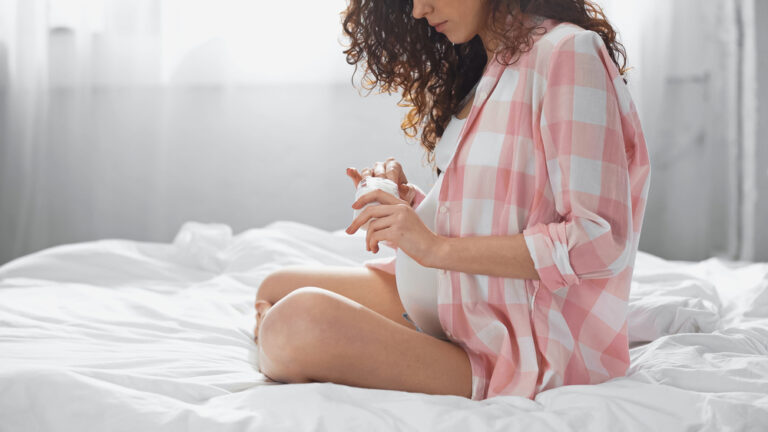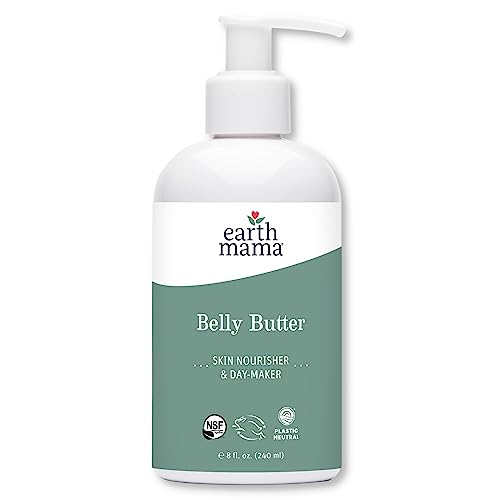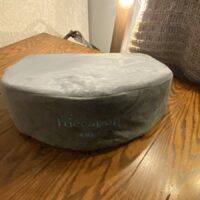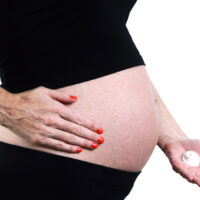Even though the preservatives found in your favorite lotions and moisturizers give them a long shelf-life, they also have a high risk to you and your unborn baby’s health. Below, you’ll find our recommendations for low-risk body lotion and moisturizer to use during pregnancy. These are free of the most common harsh, harmful ingredients and will leave your skin feeling healthy and moisturized. Always consult with your obstetrician before using any products during pregnancy.
Best Pregnancy Safe Body Lotion
Belli All Day Moisture Body Lotion
Belli All Day Moisture Body Lotion is recommended by dermatologists and OB/GYNs. It is free of harsh and harmful chemicals that may irritate your skin and deeply moisturizes your skin.
Belli body lotion has good-for-your-skin ingredients like chamomile, lemon oil, and vitamin E. It was formulated free of many synthetic or natural ingredients linked to harmful effects or birth defects. Additionally, the lotion is free of parabens, phthalates, gluten, artificial dyes, and artificial fragrances. It is also vegan and cruelty-free.
The body lotion has a thick consistency. Even though it leaves your skin feeling moisturized, it can be a little hard to rub in. The company recommends using it right after a shower when your skin is still damp, so following this recommendation might make it easier to rub the lotion in.
This has a strong, lemony scent. It is pleasant for the most part but it might be overwhelming if you don’t like citrus scents. You’ll also want to be cautious about prolonged sun exposure while wearing this. Lemon oil and other citrus oils can cause photosensitivity or sensitivity to sunlight. This causes your skin to become red and inflamed more easily than you would normally.
Pros
- Dermatologist and OB/GYN recommended
- Chamomile, lemon oil, and vitamin E
- No harmful ingredients
- Formulated for pregnant women
- Free of phthalates, parabens, artificial dyes, artificial fragrances, and gluten
- Vegan and cruelty-free
- Leaves skin feeling moisturized all-day
- Smells like lemons
Cons
- Citrus oils may make you more sensitive to sunlight
- May be hard to rub in when the skin is dry
- It is rated 3 by EWG
- Contains potential irritants/allergens and ingredients linked to potential toxicities
- Some essential oils are controversial during pregnancy
Best Pregnancy Safe Belly Butter
Belly Butter by Earth Mama
Belly Butter by Earth Mama is sold as belly butter but can be used all over your body. It is made from organic herbs and oils and free of ingredients that might harm you or your baby.
For mommies worried about stretch marks, the oils in this soften and may improve the elasticity of your skin. This reduces redness, evens tone, and may reduce stretch marks. It can also help with itchiness caused by dry skin.
Another benefit of this is the light, naturally occurring scent. Some users say it is reminiscent of an orange creamsicle. The light smell means it’s less likely to trigger nausea so you can relax while you’re pampering your skin.
This is also a great choice for sensitive skin. It has been dermatologically and clinically tested for irritation and certified by the NSF for its organic ingredients. Mama Earth belly butter also is free of mineral oil, petroleum, parabens, and artificial fragrance.
One thing to note is that you’ll want to be careful not to use too much. It leaves an oily residue if it doesn’t all absorb into your skin. Additionally, since this isn’t a thick cream, it might not work on stretch marks as well as some other options.
Pros
- Made from organic herbs and oils
- Dermatologically tested
- Light, naturally occurring scent
- NSF certified
- No parabens, petroleum, mineral oil, or artificial fragrance
- Evens skin tone and hydrates
- Improves redness, itchiness, and dryness
- It is rated 1 by EWG (Environmental Work Group)
Cons
- Not especially effective on existing stretch marks
- Leaves an oily residue if you use too much
- Sweet orange peel oil can irritate some people and make you sensitive to the sun
- Use of some essential oils is controversial during pregnancy
Best Pregnancy Safe Oil
Thena Organic Belly & Body Oil
Thena Organic Belly & Body Oil is made using natural oils that moisturize the skin without making it feel greasy. It also contains antioxidants, vitamins, and various superfood oils that nourish the skin to reduce the appearance of stretch marks and combat itchiness.
This moisturizing oil contains collagen from plant sources and Vitamin E to restore the health and elasticity of your skin. Even though it’s belly oil, it can be used all over the body. With daily use, it leaves skin moisturized and resilient. It can also even your skin tone and improve how stretch marks look. Some other key ingredients you’ll find in this include rosehip seed oil, jojoba, coconut oil, hyaluronic acid, witch hazel, and arnica extract.
Even though this is full of different oils, it absorbs into the skin well. It is also lightweight and won’t leave your skin feeling greasy. Expectant mothers may also appreciate the easy-dispense pump that makes it easy to use this all over your body. Unfortunately, the pump doesn’t always last the lifetime of the product so you may end up dumping it out in your hand if it does break.
If you’re looking for a soothing lotion that will help you relax, this is also a good choice. Its scent comes from lavender essential oil. Something to note is that the smell can be overwhelming if you’re sensitive to floral scents, though most people find it relaxing.
Pros
- Leaves skin moisturized but not greasy
- Plant-derived collagen and Vitamin E improves elasticity
- Absorbs into the skin easily
- Easy-dispense pump
- Soothing lavender smell
- Reduces the appearance of stretch marks
- Helps with redness, itchiness, and evens tone
Cons
- Smell can be overwhelming if you don’t like floral smells
- Pump doesn’t always last
- Potential irritants
- Some controversy around the use of rosemary, sweet almond oil, and other essential oils during pregnancy
Comparing the Best Pregnancy Safe Body Lotions
The table below compares only the recommended products on this page. A low or high Price means it is low or high compared to the other products listed. The Popularity Score reflects how often readers click on and buy the product. The Quality Score is our assessment of the overall performance and satisfaction with the product compared to others in the table.
| Thena Organic Belly & Body Oil | 3.9 | 9.0 | 52.00 |
| Belly Butter by Earth Mama | 9.9 | 9.2 | 20.99 |
| Belli All Day Moisture Body Lotion | 6.0 | 9.0 | 16.99 |
Buying Criteria
Toxicity
Lotion often contains preservatives and other potentially dangerous ingredients that may interrupt hormones, cause skin irritation, or even cause cancer. Our primary concern while choosing our recommendations was avoiding those with toxic ingredients.
Some of the most harmful ingredients commonly found in lotion include retinoids, triethanolamine, DMDM hydantoin, butylated hydroxyanisole, hydroquinone, phthalates, parabens, parfum, dyes, and fragrance.
How Well it Moisturizes
A quality lotion should leave your skin feeling healthy and moisturized. While you want something that is going to last all day, you don’t want a lotion that is too thick or heavy. A thick lotion may be hard to rub into the skin, while something too heavy will leave your skin feeling oily or greasy. Oily lotions may also clog pores, which can worsen the acne you may already be struggling with while you are pregnant.
In addition to how the lotion felt, we considered other effects of the lotion. Many contain ingredients that reduce redness or itchiness in addition to adding moisture. Lotions designed for pregnant mothers may also reduce the appearance of stretch marks.
While some of these lotions can be used to reduce the appearance of stretch marks, you should look for a stretch-mark-specific lotion if that is your goal. You can find our list of best stretch mark creams here.
Scent
Finally, we considered how each of these products smells. Even though body lotion generally has a pleasant smell, some scents can be overwhelming to pregnant women. They may even cause dizziness and nausea. That isn’t something you want to be dealing with when you’re trying to relax.
In addition to the scent, we also considered where the scent comes from. Artificial parfum and fragrances are more likely to be overwhelming. They also often contain dangerous compounds that may cause skin or respiratory irritation or reduce indoor air quality.
FAQs – Pregnancy Safe Body Lotion And Moisturizer
Can I use body lotion during pregnancy?
Many of the ingredients included in these products are controversial, should not be used in the first trimester of pregnancy, or have limited or no data/research on use during pregnancy. Some ingredients have been linked to other non-pregnancy-related health problems. Many products have not been evaluated by the FDA. Since no studies have been conducted with these products on pregnant women there is no absolute certainty that these are 100% safe. Always consult with your obstetrician before starting any products while your are pregnant, nursing or planning on becoming pregnant.
Since the FDA does not regulate cosmetic products, the Environmental Work Group (EWG) has created a database of products. It offers information on the most popular products and ingredients, such as whether the product is an irritant/allergen or linked to organ/reproductive toxicities. It rates products from 1 to 10, with 1 being the least toxic. It is best to stick to products that rate EWG verified, 1 or 2.
Yes, you may be able to use body lotion, moisturizers, and other beauty products while pregnant.
When you do apply lotion, there’s a minimal amount of ingredients absorbed into the body. Additionally, there isn’t any research proving body lotion and other hygiene products are harmful during pregnancy.
Even though body lotion is generally safe, you will want to avoid certain ingredients.
One useful resource for understanding product labels is the EWG (Environmental Working Group). They analyze the ingredients of different products and rank them according to toxicity, with 1 being least toxic and 10 being most toxic. Products that rank lower contain ingredients that have not been proven harmful in animal or human studies. Those that are EWG-certified have the lowest toxicity and pose a low risk to you or your unborn child.
What lotions should I avoid when pregnant?
There are several ingredients commonly used in lotions and moisturizers that may be harmful to your health. While there isn’t enough research in human studies, some have been tested on animals. Others are known carcinogens or have other harmful effects.
You should avoid lotions that contain these ingredients when you can, but especially when you are pregnant:
- Retinoids- Retinoids are a group of chemicals closely related to Vitamin A. Some of the most common derivatives you’ll find in lotions and skincare products include retinol, retinyl palmitate, Retin-A (tretinoin), Differin (adapalene), Avage, Renova, and Tazorac (tazarotene). There is a minimal amount of this ingredient that is actually absorbed into the skin, however, too much Vitamin A or vitamin A derivatives can cause birth defects. In rare cases, it can also cause fetal retinoid syndrome, which increases the risk of early birth, miscarriage, and birth defects. Retinyl palmitate is perhaps one of the most dangerous derivatives and studies in mice show that it causes tumor growth after sun exposure.
- Triethanolamine- Manufacturers usually use triethanolamine to balance pH in cosmetics like mascara and body lotion. Even though it is commonly found in cosmetic products, the Dermatology Review states that it should not be used long-term. Triethanolamine irritates the immune, skin, and respiratory systems. It has also been linked to cancer. Additionally, when disposed of improperly, it causes toxic shock to marine life because of its effects on the pH of the natural ecosystem.
- DMDM Hydantoin- DMDM hydantoin isn’t toxic itself, however, it releases small amounts of formaldehyde in beauty products over time. Companies may add it as a preservative that lengthens the shelf life of lotions and other beauty products. It also prevents the growth of mildew and bacteria. Formaldehyde is a known carcinogen and irritant according to the EPA (Environmental Protection Agency), so it’s best to avoid it if possible.
- Butylated Hydroxyanisole (BHA)- This is a food preservative and stabilizer, which is the reason it’s so popular in cosmetics. Unfortunately, BHA is also an endocrine disruptor that can negatively influence your hormones (and your baby’s development) during pregnancy. It is also a known carcinogen.
- Parabens- Companies add parabens as a preservative. They prevent the growth of fungus or bacteria in your beauty products. Some common parabens include propylparaben, butylparaben, ethylparaben, methylparaben, and isobutylparaben. They have known hormone disruptors and can increase your risk of breast cancer. They can also irritate the skin or cause allergic reactions.
- Fragrance and parfum- Even though added fragrance or parfum may make body lotion smell better, they are often derived from possibly dangerous chemicals mixed together. They can even irritate skin or cause allergic reactions. One of the most dangerous is diethyl phthalate. Phthalates can be toxic to organs and endocrine disruptors. Additionally, synthetic fragrances may release volatile organic compounds (VOCs) that negatively impact indoor air quality. They also affect asthmatics and people with respiratory allergies.
What causes skin changes during pregnancy?
Your body is going to go through many changes as it grows and prepares for the birth of your little one. Hormone changes can make skin more sensitive. These hormones can also cause acne or make your skin oily or dry. You may also find you have skin issues including stretch marks, varicose or spider veins, melasma (brown spots on the face or forehead), dark spots or coloration of the nipples, spots on your inner thigh, or linea nigra, which is a dark line that goes from your navel to your pubic area. All these changes are normal.
The best way to encourage good skin health is to eat properly. Be sure you are taking a vitamin that supports you and your growing baby and clean your skin regularly, but not excessively. If you have any specific issues you are worried about, your OB/GYN will likely be able to answer your questions.
How should I decide between using body lotion, body oil, or body butter?
While all three are primarily designed to moisturize and soften the skin, the main difference lies in the texture of the products. Body lotion usually has a higher water content which makes it feel lighter and easier to rub into your skin allowing the skin to be hydrated; body oils are made from oils without water content which makes it the lightest as it seeps quickly into your skin leaving it feeling very moisturized; and body butter is a very thick cream, which can make your skin feel heavier although it does help rejuvenate and tighten your skin.









